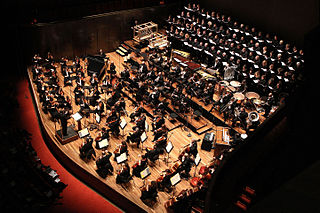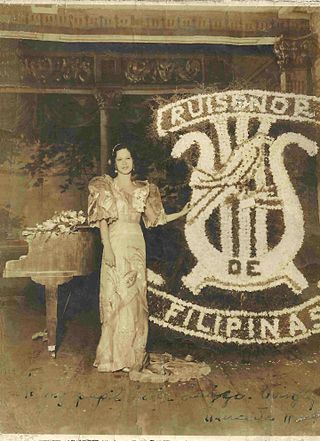
Seiji Ozawa was a Japanese conductor known internationally for his work as music director of the Toronto Symphony Orchestra, the San Francisco Symphony, and especially the Boston Symphony Orchestra (BSO), where he served from 1973 for 29 years. After conducting the Vienna New Year's Concert in 2002, he was director of the Vienna State Opera until 2010. In Japan, he founded the Saito Kinen Orchestra in 1984, their festival in 1992, and the Tokyo Opera Nomori in 2005.

Levi Celerio was a Filipino composer and lyricist who is credited with writing over 4,000 songs. Celerio was recognized as a National Artist of the Philippines for Music and Literature in 1997.

The Milwaukee Symphony Orchestra (MSO) is an American symphony orchestra based in Milwaukee, Wisconsin. The orchestra performs primarily at the Bradley Symphony Center in Allen-Bradley Hall. The orchestra also serves as the orchestra for Florentine Opera productions.

The Melbourne Symphony Orchestra (MSO) is an Australian orchestra based in Melbourne. The MSO is resident at Hamer Hall. The MSO has its own choir, the MSO Chorus, following integration with the Melbourne Chorale in 2008.

Raymundo Cipriano Pujante Cayabyab, known professionally as Ryan Cayabyab, is a Filipino musician, composer and conductor regarded as one of the pillars and icons of Original Pilipino Music (OPM). He was the Executive and Artistic Director for several years for the defunct San Miguel Foundation for the Performing Arts. He was named National Artist of the Philippines for Music in 2018.

The Philippine Philharmonic Orchestra (PPO) is the resident symphony orchestra of the Cultural Center of the Philippines (CCP). It is currently under the musical direction of its resident conductor and associate conductor, Dr. Herminigildo Ranera.

Gerard Imutan Salonga is a Filipino musical conductor, composer, and arranger. From 2012 to 2020, he was the music director of the ABS-CBN Philharmonic Orchestra, assistant conductor of the Hong Kong Philharmonic Orchestra from 2016 to 2018, and from 2019 to the present the resident conductor of the Malaysian Philharmonic Orchestra.

Francisco Santiago Santiago was a Filipino musician, sometimes called The Father of Kundiman Art Song.
Federico "Fred" Díaz Elizalde was a Spanish Filipino classical and jazz pianist, composer, conductor, and bandleader, influential in the British dance band era.
Herbert Zipper was an internationally renowned composer, conductor, and arts activist. As an inmate at Dachau concentration camp in the late 1930s, he arranged to have crude musical instruments constructed out of stolen material, and formed a small secret orchestra which performed on Sunday afternoons for the other inmates. Together with friend Jura Soyfer, he composed the "Dachau Lied", which was learned by the other prisoners. Released in 1939, he accepted an invitation to conduct the Manila Symphony Orchestra. Jailed for four months by the Japanese during their occupation of the Philippines, after his release, he worked secretly for the Allies, transmitting shipping information by radio. After the war, he emigrated to the United States in 1946, where he conducted the Brooklyn Symphony Orchestra and promoted music education.
Armando V. Salarza is an internationally acclaimed concert organist, harpsichordist, conductor and the titular organist of the Bamboo Organ of Las Piñas City, Philippines.

Yaacov Bergman was an Israeli-born conductor. He was the musical director and conductor of the Walla Walla Symphony from 1987 until his death, conductor of the Portland Chamber Orchestra, and artistic director of the Siletz Bay Music Festival in Oregon. He conducted as a guest worldwide.
Jiří Tancibudek AM was a Czech-born Australian oboist, conductor and teacher of great renown in his adopted country and elsewhere. His obituary in the Adelaide Review, titled "Prince of the oboe", said of his playing:
Ernani Joson Cuenco was a Filipino composer, film scorer, musical director, music teacher and Philippine National Artist for Music. He wrote an outstanding and memorable body of works that resonate with the Filipino sense of musicality and which embody an ingenious voice that raises the aesthetic dimensions of contemporary Filipino music. Cuenco played with the Filipino Youth Symphony Orchestra and the Manila Symphony Orchestra from 1960 to 1968, and the Manila Chamber Soloists from 1966 to 1970. He completed a music degree in piano and cello from the University of Santo Tomas where he also taught for decades until his death in 1988.

Marlon Daniel is an American composer, conductor, and music director. He is known for being a specialist in the music of Chevalier de Saint-Georges. Daniel was the winner of the 2009 John and Mary Virginia Foncannon Conducting Award, and a prizewinner at the 2018 Bucharest Symphony Orchestra International Conducting Competition.
Benjamin Northey is an Australian conductor, musician and arranger. He has been Chief Conductor of the Christchurch Symphony Orchestra in New Zealand since 2015. He is also the Principal Conductor and Artistic Advisor - Learning and Engagement of the Melbourne Symphony Orchestra having previously been Principal Conductor in Residence from 2020-2023. He was previously the Associate Conductor of the Melbourne Symphony Orchestra from 2010-2019. He is also the Artistic Director Designate of the Australian Conducting Academy, a national training program for Australian and New Zealand Conductors which he will commence in 2025.

Black conductors are musicians of African, Caribbean, African-American ancestry and other members of the African diaspora who are musical ensemble leaders who direct classical music performances, such as an orchestral or choral concerts, or jazz ensemble big band concerts by way of visible gestures with the hands, arms, face and head. Conductors of African descent are rare, as the vast majority are male and Caucasian.
Trudl Dubsky Zipper, born Gertruda Dubsky, was an Austrian-American innovative dancer, choreographer and teacher.

Mercedes Matias Santiago was a Filipino soprano and music educator.

The Philam Life Theater, also styled Philamlife Theater, was a performing arts venue at 1440 United Nations Avenue in the Ermita district of Manila, the Philippines. It opened in 1961 as the Philam Life Auditorium and was designed by Filipino architect Carlos Arguelles as part of the corporate headquarters for the Philam Life insurance company. The International Style concert hall in the eastern annex of the Philam Life Building is known for its superior acoustics and elegant interior. It served as Manila's cultural center for almost a decade and has played host to world-renowned musicians, choirs and symphony orchestras over its 53-year history, including Renata Tebaldi, Franco Corelli, Marian Anderson, Pinchas Zukerman and Cecile Licad. The theater also served as the home of the Manila Symphony Orchestra, the Manila Philharmonic Orchestra and the Philippine Educational Theater Association.












